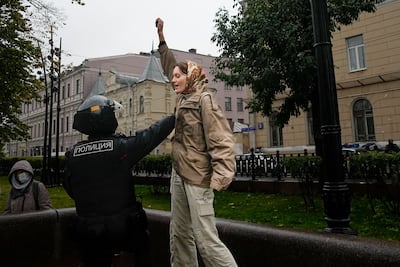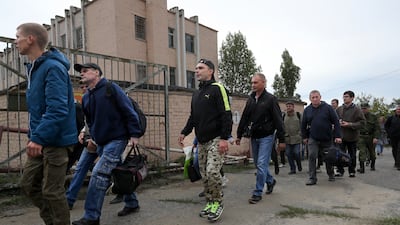New Russian recruits in Ukraine are likely to face a “high attrition rate” due to inadequate training, British military intelligence says.
Russian President Vladimir Putin last week announced a plan to mobilise 300,000 fighters for the war in Ukraine in the country’s first compulsory military draft since the Second World War.
The country moved quickly to draft reserves, issuing “many tens of thousands” of call-up papers in the days following, the UK’s Ministry of Defence said.
“The initial tranches of men called up under Russia’s partial mobilisation have started arriving at military bases," the MoD said in its latest intelligence assessment.
“Russia will now face an administrative and logistical challenge to provide training for the troops.”
Unlike most Western armies, the Russian military provides “low-level, initial training to soldiers within their designated operational units, rather than in dedicated training establishments,” it said.
Usually one battalion within each brigade will remain in garrison if the other two deploy and can provide instructors to train any new recruits.
“However, Russia has deployed many of these third battalions to Ukraine,” the MoD said.
“Many of the drafted troops will not have had any military experience for some years.
“The lack of military trainers, and the haste with which Russia has started the mobilisation, suggests that many of the drafted troops will deploy to the front line with minimal relevant preparation. They are likely to suffer a high attrition rate.”
The call-up prompted demonstrations across Russia, with police detaining more than 730 people, including 300 in Moscow and about 150 in St Petersburg.

Protests against the draft took place in 32 cities, rights group OVD-Info said.
The rallies on Saturday came as Russia signed into law new anti-desertion measures and neighbouring countries confirmed queues of people trying to leave Russia.
New sentencing toughens the penalties for desertion, refusal to fight and voluntary surrender, with up to 10 years in prison.
Mr Putin's military mobilisation order, threats to use nuclear weapons and a push to annex parts of Ukrainian territory mark a new stage in the seven-month-old conflict.
The latest escalation has reverberated across markets: oil prices are sharply higher, raising the spectre of more pain on the energy front for Europe. Meanwhile, EU foreign ministers are readying another package of sanctions — their eighth one — which could be formalised in mid-October.
Meanwhile, the Ukrainian ambassador to the UK has pleaded for continued generosity and patience from those offering a home to refugees in Britain.
Vadym Prystaiko said Ukraine needed "much more" help from the UK as the country fights back against Moscow's invasion. He said the partial mobilisation of Russian reservists amounted to "something formidable".
"We hoped to reach a six-month period by the sponsorship agreement between most of the UK citizens and Ukrainians who came here," he said.
"I just hope that the generosity, tolerance, kindness, patience of these people will allow us to engage with Ukrainians who still need some support here."
He added: "Still we need support here, helping these people to go through the most difficult times of the war."


